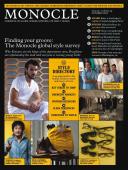
Issue 37
For our October issue, we explain why the Koreans are the kings of the department store, Brazilians are refashioning the mall, and everyone is wooing young Turks. There’s also a 44-page guide to the brands, business trends and buyers of 2010.
In This Issue
Oops! No content was found.
Looks like we no longer have content for the page you're on. Perhaps try a search?
Return Home

